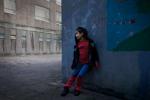
Les festivités sont un révélateur de
nous-mêmes. Ressortissants d'un pays qui fête une victoire
olympique, parents imaginaires d'une équipe de foot nationale qui
gagne. (Arrière-)petits-enfants de tel ou tel prophète, fidèle
d'une religion ou d'un culte qui se prétendent supérieurs.
Elles nous présentent comme des
musulmans, qui célèbrent la circoncision de leurs fils au cours de
festivités qui laisseront un souvenir impérissable à toutes les
personnes présentes. Elles nous confirment dans notre identité de
chrétiens, qui louvoient entre vendredi saint, dinde de Noël,
agneau pascal et branches de buis bénit.
Bruxelles les subit toutes. Ou presque.
Les traditions, les fêtes nationales, joyeuses ou malheureuses, et
dans la plupart des cas, les événements historiques un peu sacrés
qui ne sont pas fêtés ici, peu importe quand et où ils se sont
déroulés.
Il est à espérer que les fêtes
fédèrent les individus, qu'elles dépassent les clivages des races,
des nationalités, des idéologies ou de la foi. Espérer.
Ce que nous fêtons et la façon dont
nous le faisons sont comme un passeport social. Ils nous cataloguent,
nous font revenir en arrière, à une époque passée, où il fallait
encore poser des choix individuels conscients, aux communautés dont
nous sommes originaires, que notre loyauté actuelle envers elles
soit grande ou non.
Ce qui incite les uns à se réjouir
et à s'affirmer, suscitera souvent le mécontentement des autres.
Il suffit d'écouter les commentaires
désobligeants des autochtones à l'encontre de leurs collègues qui
pratiquent le ramadan. La mauvaise humeur des fumeurs qui doivent
s'abstenir temporairement de leur cigarette, la fatigue perpétuelle,
l'augmentation de l'absentéisme. Interrogez les homos et les
lesbiennes qui se disent oui à l'hôtel de ville. Souvent, leur
cortège qui traverse les petites rues est hué par des jeunes
désuvrés à l'esprit étroit.
Voyez le désespoir et la soumission
dans les églises messianiques et lisez les études sociologiques sur
ces formes intolérables de manipulation et de charlatanisme. Captez
l'humeur de la rue: chaque fois que le ballon rond monopolise le
petit écran et les pensées de millions de spectateurs, les coups de
klaxon de joie des uns valent aux autres des nuits blanches et des
frustrations.
Bruxelles est de toutes les
célébrations, sous la pluie, dans le brouillard, sous la neige, le
soleil ou la grêle. Aucun mystère ne nous est épargné. Les
familles, les clubs, les quartiers, les communautés font la fête.
Ils le font chacun dans leur coin, à côté, tout contre mais jamais
ensemble. En râlant sur les autres.
Bruxelles fait la fête, mais si
rarement comme Zinneke, ensemble. Mon Zinneke, ton Zinneke, le nôtre.
Une parade au cur à cur, par la ville et à travers elle. Une
fête du Bruxelles dont nous rêvons.
Categorie:Articles en français
|
